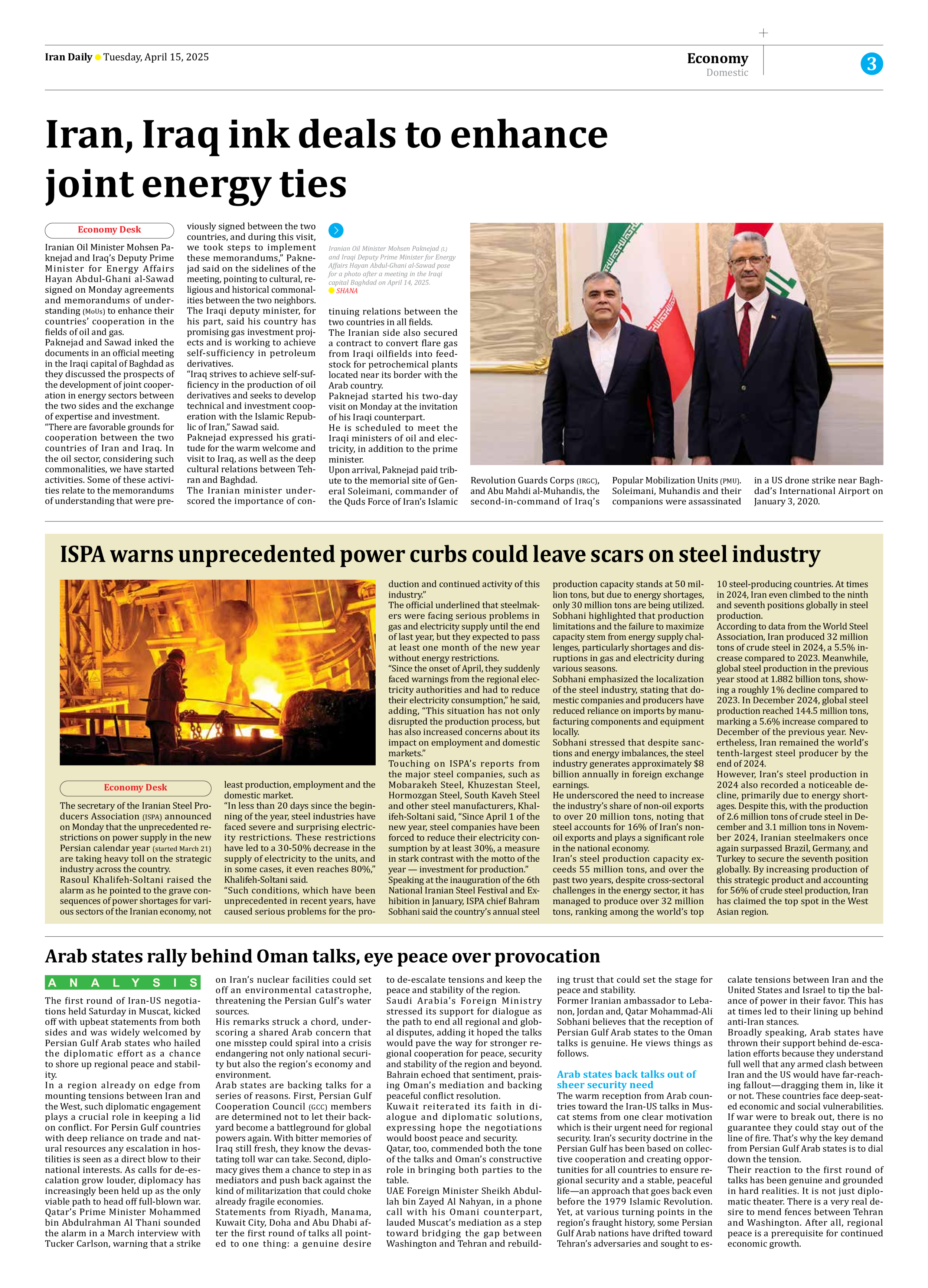
Arab states rally behind Oman talks, eye peace over provocation
The first round of Iran-US negotiations held Saturday in Muscat, kicked off with upbeat statements from both sides and was widely welcomed by Persian Gulf Arab states who hailed the diplomatic effort as a chance to shore up regional peace and stability.
In a region already on edge from mounting tensions between Iran and the West, such diplomatic engagement plays a crucial role in keeping a lid on conflict. For Persin Gulf countries with deep reliance on trade and natural resources any escalation in hostilities is seen as a direct blow to their national interests. As calls for de-escalation grow louder, diplomacy has increasingly been held up as the only viable path to head off full-blown war.
Qatar’s Prime Minister Mohammed bin Abdulrahman Al Thani sounded the alarm in a March interview with Tucker Carlson, warning that a strike on Iran’s nuclear facilities could set off an environmental catastrophe, threatening the Persian Gulf’s water sources.
His remarks struck a chord, underscoring a shared Arab concern that one misstep could spiral into a crisis endangering not only national security but also the region’s economy and environment.
Arab states are backing talks for a series of reasons. First, Persian Gulf Cooperation Council (GCC) members are determined not to let their backyard become a battleground for global powers again. With bitter memories of Iraq still fresh, they know the devastating toll war can take. Second, diplomacy gives them a chance to step in as mediators and push back against the kind of militarization that could choke already fragile economies.
Statements from Riyadh, Manama, Kuwait City, Doha and Abu Dhabi after the first round of talks all pointed to one thing: a genuine desire to de-escalate tensions and keep the peace and stability of the region.
Saudi Arabia’s Foreign Ministry stressed its support for dialogue as the path to end all regional and global disputes, adding it hoped the talks would pave the way for stronger regional cooperation for peace, security and stability of the region and beyond.
Bahrain echoed that sentiment, praising Oman’s mediation and backing peaceful conflict resolution.
Kuwait reiterated its faith in dialogue and diplomatic solutions, expressing hope the negotiations would boost peace and security.
Qatar, too, commended both the tone of the talks and Oman’s constructive role in bringing both parties to the table.
UAE Foreign Minister Sheikh Abdullah bin Zayed Al Nahyan, in a phone call with his Omani counterpart, lauded Muscat’s mediation as a step toward bridging the gap between Washington and Tehran and rebuilding trust that could set the stage for peace and stability.
Former Iranian ambassador to Lebanon, Jordan and, Qatar Mohammad-Ali Sobhani believes that the reception of Persian Gulf Arab states to the Oman talks is genuine. He views things as follows.
Arab states back talks out of sheer security need
The warm reception from Arab countries toward the Iran-US talks in Muscat stems from one clear motivation which is their urgent need for regional security. Iran’s security doctrine in the Persian Gulf has been based on collective cooperation and creating opportunities for all countries to ensure regional security and a stable, peaceful life—an approach that goes back even before the 1979 Islamic Revolution. Yet, at various turning points in the region’s fraught history, some Persian Gulf Arab nations have drifted toward Tehran’s adversaries and sought to escalate tensions between Iran and the United States and Israel to tip the balance of power in their favor. This has at times led to their lining up behind anti-Iran stances.
Broadly speaking, Arab states have thrown their support behind de-escalation efforts because they understand full well that any armed clash between Iran and the US would have far-reaching fallout—dragging them in, like it or not. These countries face deep-seated economic and social vulnerabilities. If war were to break out, there is no guarantee they could stay out of the line of fire. That’s why the key demand from Persian Gulf Arab states is to dial down the tension.
Their reaction to the first round of talks has been genuine and grounded in hard realities. It is not just diplomatic theater. There is a very real desire to mend fences between Tehran and Washington. After all, regional peace is a prerequisite for continued economic growth.







